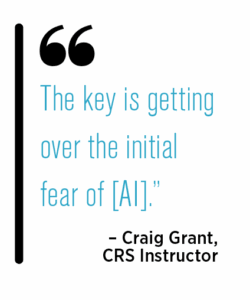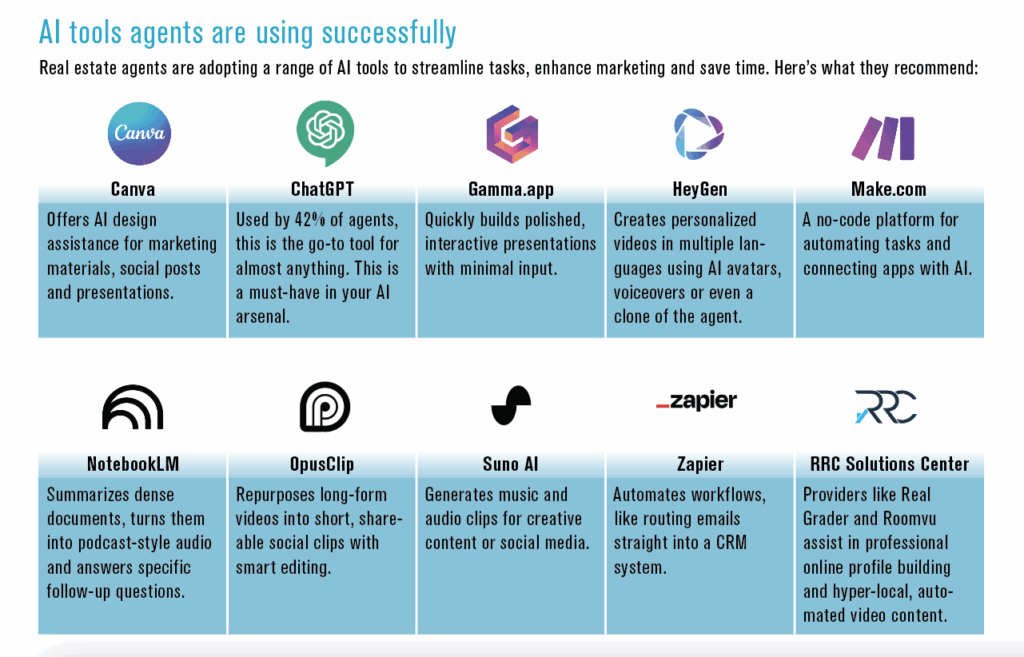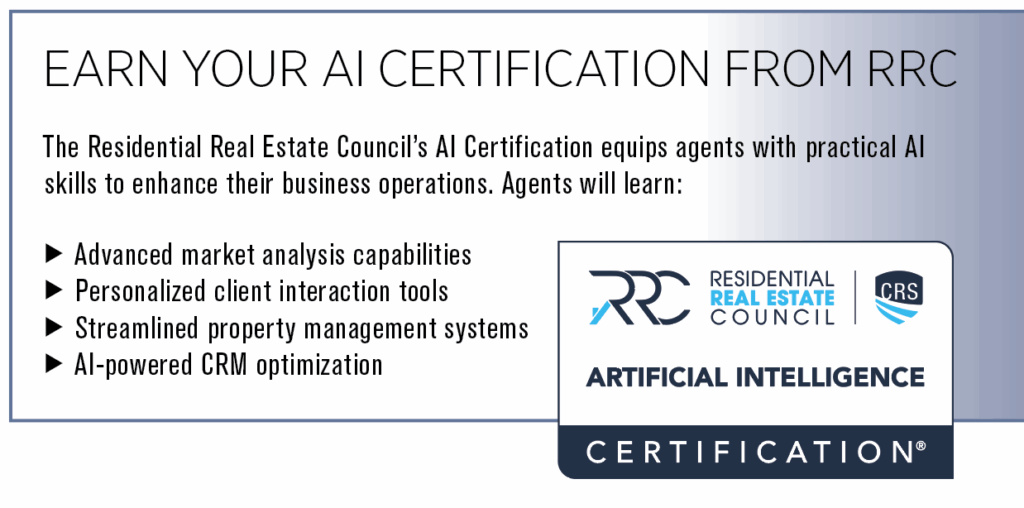By Michelle Huffman
Artificial intelligence is impacting nearly every industry—and real estate is no different.
According to the National Association of REALTORS® 2024 Technology Survey, 65% of real estate professionals are very or somewhat familiar with AI, and 56% use AI tools at least once or twice a month. That includes 17% who use them weekly and 9% who rely on them daily.
AI is more than a trendy tool for these early adopters—it can be transformative. Those who take the time to learn and apply these tools are discovering new ways to save time, work more efficiently and ultimately increase their bottom line.
“The best thing you get from AI is time,” says Matthew Rathbun, CRS, with Coldwell Banker Elite and President of Four Pillars Education, Inc. in Fredericksburg, Virginia. “It gives you time that you can invest in being with people instead of being stuck behind your keyboard.”
From Click to Close: Where AI Fits In
AI tools can support nearly every stage of a real estate agent’s workflow. Here’s where they shine:
- Lead generation: AI can help design landing pages, draft engaging emails and schedule personalized outreach. No-code tools make it affordable and accessible to agents at all tech levels, Rathbun says.
- Marketing content: Programs like ChatGPT and Canva can produce social media posts, blog content, email campaigns and listing flyers—in minutes, not hours.
- Listing descriptions: Rathbun uses Apple Notes to describe a property as he walks it, then turns those notes over to his AI tools to generate compelling, customized descriptions.
- Business management: Instead of rereading forms or contracts multiple times a day, brokerages can create a custom GPT that agents can ask to summarize sections or answer specific legal questions—cutting down repetitive tasks.
- Market research: AI tools help Addie Owens, CRS Instructor, principal broker and CEO of Touchstone Real Estate in Central Florida, stay on top of market trends by summarizing reports or analyzing MLS and public data for insights.
- Admin support: Many agents use AI as a virtual assistant to create task lists and social media calendars or respond to routine messages.
Work Smarter, Not Harder: Implementing and Evaluating AI
Getting started with AI is less about technical know-how and more about mindset. “The key is getting over the initial fear of it,” says Craig Grant, CRS Instructor and CEO of the Real Estate Technology Institute based out of Stuart, Florida. “Once agents spend a little time experimenting and getting comfortable, the time savings can quickly translate into real value.” Here’s how to begin implementing and evaluating AI effectively:
- Set expectations: Expect a learning curve in the first few months. As you use these tools, they will learn your tone, style and goals, and you will learn how to use them more effectively, Owens says.
- Know your value: You have to know how much your time is worth per hour, and how much time your varied tasks take to calculate the real return on investment through saved time, Rathbun says.
- Audit your workflow: Owens recommends using AI in time-consuming areas like listing descriptions, marketing content or data analysis. Identify what’s repetitive and ask: Can AI do this faster and just as well?
- Experiment first: “There’s no one right way to use AI,” Grant says. “It’s about getting in there, trying it out and finding what fits your business. Start with simple tasks and build from there and understand that prompting is very conversational. You can also use AI to teach you how to be a better prompter by asking it to rate your prompts.”
- Think in sequences: A sequence is when one prompt builds off a previous prompt and it’s one of the most powerful aspects of using AI, Grant says. Start by asking it to brainstorm a list of content ideas, then ask it to write a blog article from the list, then request a video script for the idea, followed by social media posts.
- Fill business gaps: AI can help build marketing plans, business procedures or even basic legal guidance. “If you have a weak spot in your business—marketing, budgeting, planning—AI can help fill in the blanks. Just be careful because it could provide false or misleading information,” Grant says.
Proceed with Caution: Stay in the Driver’s Seat
AI can be powerful, but it still requires thoughtful oversight. Agents should remain actively involved to ensure that content is accurate, ethical and aligned with their brand.
- Always edit: “AI-generated content is only a first draft,” Rathbun says. “You still have to read it, shape it and make it yours.”
- Ensure Fair Housing Act compliance: AI tools don’t automatically know the legal guidelines. Be specific in prompts to ensure content reflects the communities you serve and avoids bias, Rathbun says.
- Protect your privacy: Avoid uploading proprietary or copyrighted material into AI tools without understanding the risks. Owens reminds agents: “You still have the right to your privacy and your unique body of work.”
- Use the right tools: Grant warns that you need to be careful and use the right AI tools for the right tasks. You can use AI for things like virtual staging, but it may modify the image, such as changing the flooring or placement of doorways without your permission to avoid violating copyright laws.
Regardless of how you integrate AI into your business practice, the experts recommend starting now. AI isn’t a passing trend—it’s fast becoming an everyday tool that will define how business is done.
“In five years, it’s going to be so infused into everyday life, we won’t even think about using it. It’ll be like GPS,” Owens says. “Agents using AI will run circles around agents who aren’t. Those who are not using AI, or think they aren’t, will stand out as much as an agent handing out paper maps for their showing tours—and not in a good way.”










